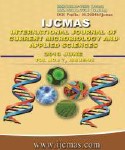


 National Academy of Agricultural Sciences (NAAS)
National Academy of Agricultural Sciences (NAAS)

|
PRINT ISSN : 2319-7692
Online ISSN : 2319-7706 Issues : 12 per year Publisher : Excellent Publishers Email : editorijcmas@gmail.com / submit@ijcmas.com Editor-in-chief: Dr.M.Prakash Index Copernicus ICV 2018: 95.39 NAAS RATING 2020: 5.38 |
A biscuit is a baked, commonly flour-based food product. They are made with baking powder or baking soda as a chemical leavening agent rather than yeast. Biscuit’s ingredients are wheat flour, sugar, butter or oil, eggs and baking powder. Sometimes other ingredients like fruit pieces, nut, raisins, improver and stabilizer are used. In this present study a novel tea-biscuit was produced by incorporating betel leaf oil as essential oil in the formulation of the biscuit. Essential oils are mainly considered as GRAS materials. So, in this formulation of tea-biscuit 0.025%, 0.05%, 0.075% and 0.1% essential oil of betel leaf was used in volume by weight of flour. When the novel tea-biscuit was produced it underwent the process of determination of sensory and physical properties and chemical analysis. Sensory test of preferences was done using a 9-point hedonic scale. After the test, it was found that the tea-biscuit having 0.075% essential oil was best among all novel tea-biscuits. Physical property like hardness, spread ratio, % spread was measured for all the samples of biscuits. It has been found that the values of hardness for the novel tea-biscuit having 0.075% essential oil were 1390.5 g-force, while the control one has lesser values than the novel one. In novel-tea biscuit protein content, fat content, crude fiber content was 8.52%, 24.77%, 1.65%, respectively. The energy of developed tea biscuit was highest among all samples which were about 478.65Kcal/100g. After all the tests were concluded the economic feasibility of the baking process was done, where it has been found that if the selling is done at the rate of Rs. 9 per 50 g(10 biscuits), there will be more than 10% profit in this process and the price is within the range of the market available biscuits. Therefore, commercialization of the process can be done since the process is economically viable and self-sustainable.
 |
 |
 |
 |
 |